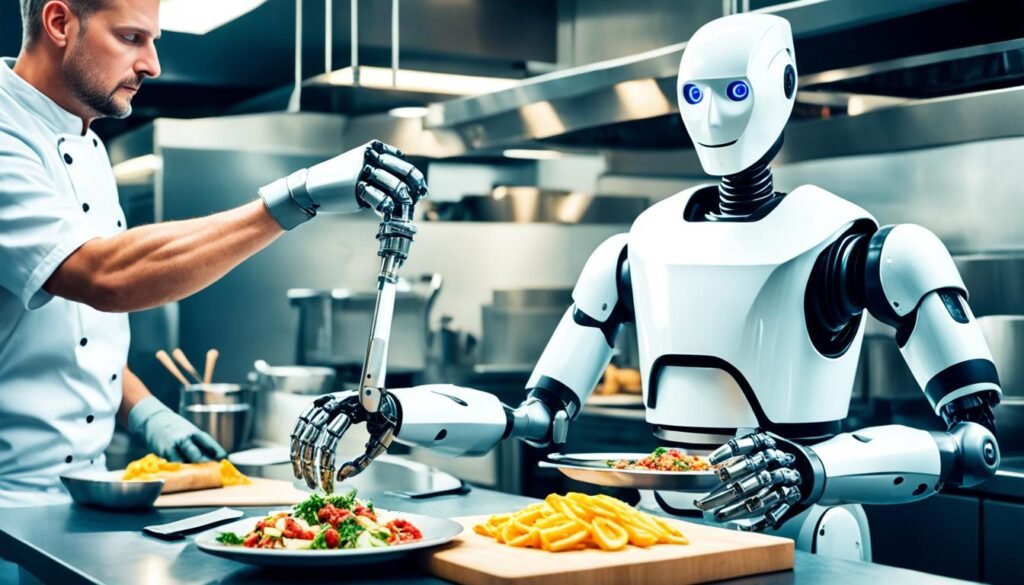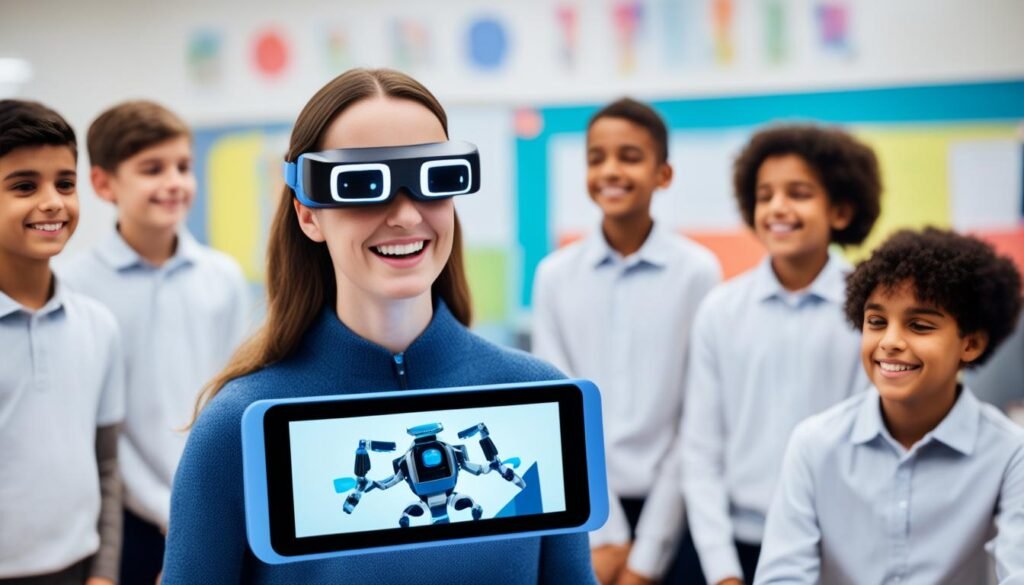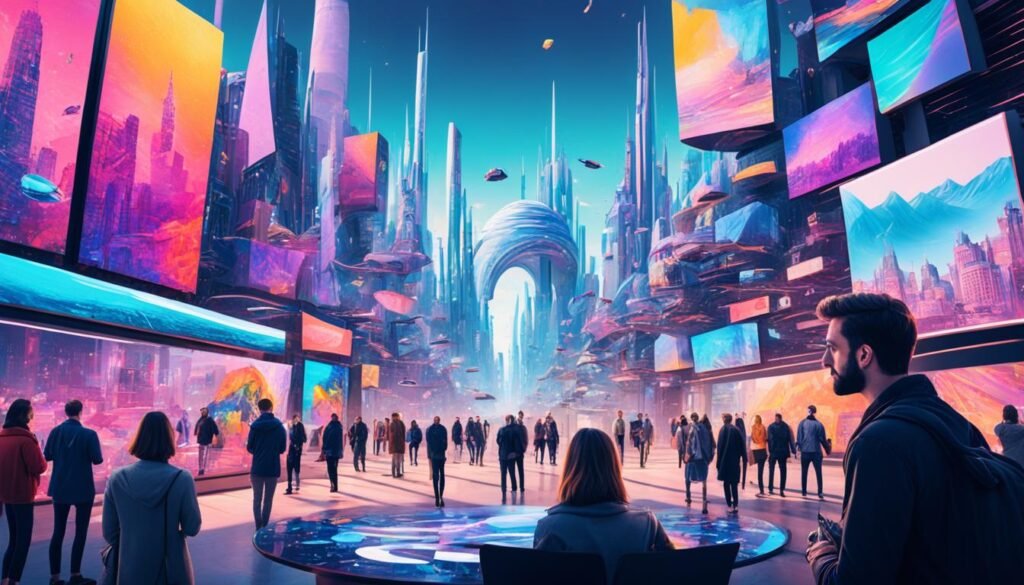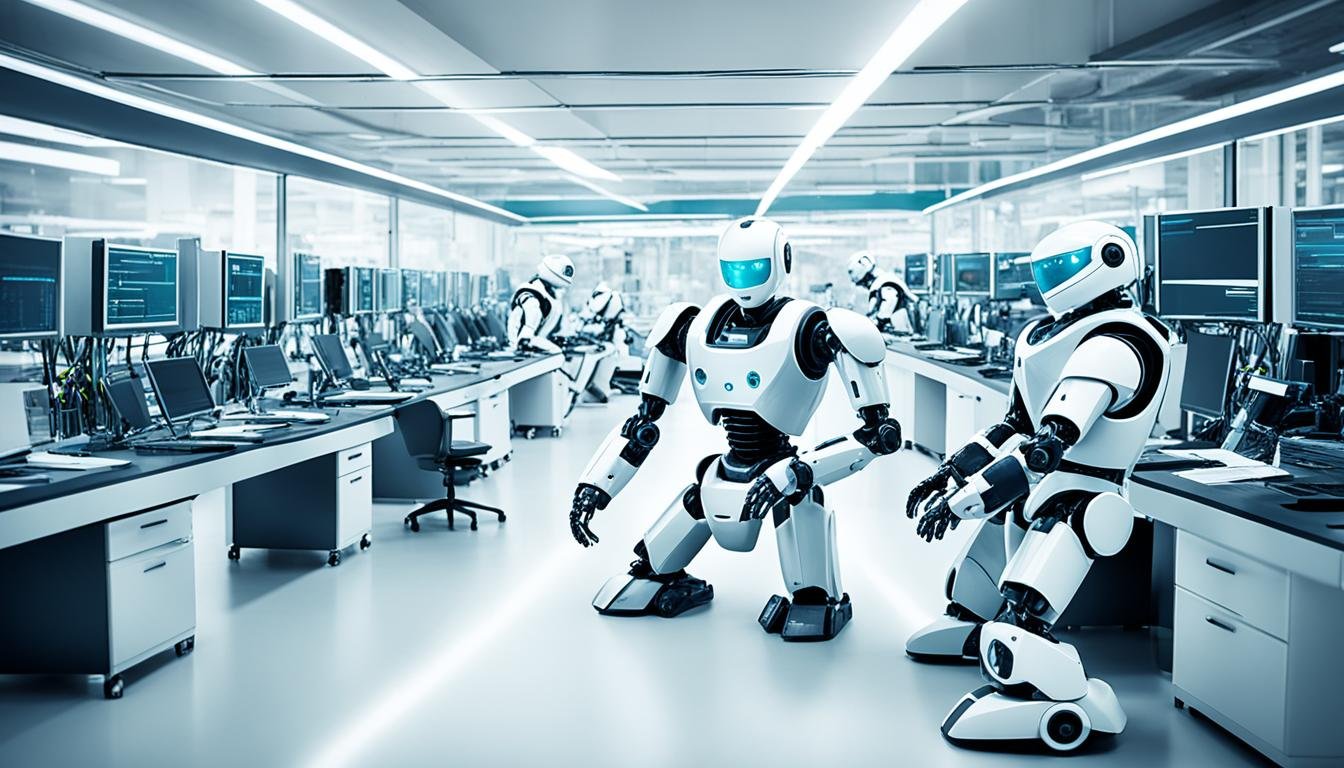A Goldman Sachs study found that AI tools like ChatGPT could affect up to 300 million full-time jobs worldwide. This shows how big the impact of artificial intelligence (AI) will be on jobs in the future.
As AI gets better, some jobs and industries are more likely to be automated. Knowing which jobs are most at risk is important for employers and workers to understand the future job market.
Key Takeaways
- Jobs that involve routine tasks, like data entry and administrative work, are most likely to be automated by AI.
- Customer service jobs could be replaced by AI chatbots and virtual assistants that can handle simple questions well.
- Jobs that need analysis, such as financial analysis and report making, are becoming automated. AI can quickly go through large datasets and make reports.
- Tech jobs, including coding, programming, and software engineering, might be taken over by AI technologies that can write code and automate tech tasks.
- Education and training will need to change to help workers move to jobs where their skills are still needed despite AI.
Introduction
AI is changing fast, making people worry about its effect on jobs. It’s moving from factories to offices, threatening high-paid jobs. Knowing which jobs are at risk is key for workers to adjust and get ready for new job trends.
Overview of AI’s Rapid Advancement and Its Potential Impact on the Workforce
AI could add $13 trillion to the global economy by 2030, making it 16% bigger than today. By then, 70% of companies will use AI, but only half will fully use five AI types. This could change the job world a lot, possibly replacing 300 million jobs worldwide and a quarter of tasks in the US and Europe.
Importance of Understanding Which Jobs Are Most Vulnerable to AI Disruption
As AI gets better, knowing which jobs are at risk is vital. This helps workers and employers plan for the future. By keeping up with AI trends, people can make smart career choices and secure their jobs.
“AI technology could have a similar impact on intellectual labor that the steam engine had on mechanical labor during the Industrial Revolution.”
AI could change the job world a lot, possibly automating up to a quarter of US and European jobs. White-collar workers making up to $80,000 a year might be most at risk. Jobs like customer service reps, receptionists, and salespeople could be hit hard by AI.
But, jobs needing social skills, high-level thinking, and complex problem-solving might not be replaced by AI. Teachers, lawyers, judges, and executives are likely to be less affected.
AI and the Threat to White-Collar Jobs
AI is moving fast and now touches white-collar jobs, not just blue-collar ones. This change worries many white-collar workers about their jobs. They’re concerned about losing their high-paying jobs.
Historical Context: AI’s Transition from Factory Floors to Office Spaces
Before, tech made blue-collar jobs easier by automating physical tasks. Now, AI is moving into white-collar work. Jobs like data analysis and bookkeeping, once done by well-educated professionals, are now at risk.
Goldman Sachs’ Prediction of 300 Million Jobs Lost or Diminished Due to AI
A report from Goldman Sachs highlights the danger AI poses to white-collar jobs. It says 300 million jobs in the U.S. and Europe could be lost or changed by AI. This news has made white-collar workers worry about their future.
| Key Findings on AI’s Impact on White-Collar Jobs |
|---|
|
AI’s fast growth is a big threat to white-collar jobs, as experts warn. As this change happens, workers need to keep up, adapt, and find new ways to stay ahead in the job market.
Roles Less Likely to Be Impacted by AI
Many white-collar jobs might be at risk from AI, but some are safer. These jobs often need a lot of social or emotional skills. They also require making big decisions and giving advice.
Jobs Requiring Emotional Intelligence
Jobs like therapists, counselors, social workers, and teachers are safe from AI. They need a human touch and empathy. AI can’t yet understand and connect with people like we do.
High-Level Decision-Making Roles
Jobs that make big decisions, like management consultants, are safe from AI too. These jobs need complex problem-solving and creativity. AI hasn’t yet learned to handle these tasks well.
A survey by ResumeBuilder found 37% of business leaders are using AI to replace staff. But jobs that need social or emotional skills and big decisions are still safe from AI.
“AI is projected to replace 85 million jobs worldwide by 2025, but it is also expected to create 97 million new jobs during the same period.”
As AI gets better, it’s important to know which jobs are safe. By looking into jobs safe from AI replacement, people can find ai-proof occupations and ai-resistant careers. This way, they can stay ahead in a changing job market.
which jobs will ai replace first
Artificial intelligence (AI) is getting better, making people worry about losing their jobs. Some jobs are more likely to be taken over by machines. Knowing which jobs are at risk can help people and industries get ready for these changes.
Data Analysis, Bookkeeping, and Administrative Tasks at High Risk
Jobs like data analysis, bookkeeping, and simple financial reporting are at high risk. AI tools can do these tasks better and faster than people. A study by Frey and Osborne says 47% of U.S. jobs could be replaced by computers in 10 to 20 years. Jobs in transportation, logistics, and administrative support are most at risk.
AI’s Impact on Legal, Media, and Marketing Professions
AI is also changing jobs in the legal, media, and marketing fields. AI can go through lots of language data quickly, making tasks like legal research and content creation easier for machines. A study found that 79% of working women and 58% of working men have jobs at risk of being automated.
“AI could automate 44% of tasks typically handled by U.S. and European legal assistants,” according to a report by Goldman Sachs.
As AI gets better, it’s important for people and industries to keep up and adapt. Knowing which jobs are most at risk helps us get ready for the future. We can look into learning new skills to stay ahead in the changing job market.

Tech Jobs and the Threat of AI Displacement
AI is changing fast, making us worry about its effect on jobs, especially in tech. Jobs like software developers, web developers, and data scientists could be at risk. AI might change how these jobs work.
Coders, Programmers, and Software Engineers at Risk
AI tools like ChatGPT can write code faster and better than people in many cases. This could mean fewer jobs for coders and software engineers. Some think AI will help coders, but it can also automate some tasks.
AI’s Ability to Automate Tech Tasks
AI is getting smarter and can now do many tasks that humans used to do. It can analyze data and even help with software development. This could mean fewer jobs for coders and programmers.
A MIT and Boston University report says AI might replace up to two million manufacturing workers by 2025. A McKinsey Global Institute study also warns that by 2030, up to 14% of workers might need new careers because of AI.
As AI becomes more common, tech workers need to keep up with the changes. They should learn about the risks and update their skills. This way, they can keep up with the changing tech world.
AI and the Future of Education
AI is changing fast, and education is feeling its effects. Experts worry that tools like ChatGPT might replace teachers. But many teachers think AI can help with planning lessons. They believe the human touch and expertise teachers offer can’t be replaced.
Concerns about AI’s Potential to Replace Teachers
The World Economic Forum says AI could take about 85 million jobs by 2025, and maybe 300 million later on. This makes people worry about teachers’ jobs. A report says AI might automate a quarter of work in the U.S. and Europe. It also says about two-thirds of jobs in those areas could be affected by AI, with 25% possibly done by AI alone.
The Ongoing Need for Human Connection in Education
Even if AI can automate some tasks, many teachers think the human touch is key. They say AI can’t match the personal relationships, individual attention, and complex social and emotional support teachers give. As one teacher stated, “AI can assist us, but it can never replace the human connection and understanding that teachers bring to the classroom.”
AI might make learning more personalized and give us new insights, but we still need human interaction and problem-solving in education. As education changes, finding the right balance between using AI and keeping human teachers’ roles is crucial.

| Potential Impact of AI on Education | Potential Benefits | Potential Challenges |
|---|---|---|
| Automating administrative tasks | Increased efficiency and time savings for teachers | Concerns about job displacement and the need for teacher retraining |
| Personalized learning experiences | Tailored instruction to individual student needs | Maintaining the human connection and emotional support for students |
| Data-driven insights and decision-making | Improved understanding of student progress and needs | Ethical considerations around data privacy and algorithmic bias |
| Automated grading and feedback | Timely and consistent feedback for students | Concerns about the quality and nuance of feedback from AI |
As we move forward with AI in education, it’s important for everyone to talk and work together. We need to make sure AI helps, not harms, the role of human teachers.
Financial Sector Jobs Under Threat
The growth of AI is changing jobs in the financial sector. Financial analysts and personal financial advisors are at risk due to AI automation.
AI’s impact on financial analysts is big. It can spot market trends, check how investments are doing, and predict the best investment mixes. This could mean many tasks done by analysts might be automated, making some jobs less needed.
AI is also changing trading and investment banking. It can go through financial data faster and understand it better than people in some cases. This could lead to more automation in these fields.
| Sector | AI’s Potential Impact |
|---|---|
| Financial Analysts | AI can automate tasks like identifying market trends, analyzing portfolio performance, and forecasting investment mixes. |
| Trading and Investment Banking | AI can process and interpret financial data more efficiently than humans, potentially automating certain functions. |
A report says by 2027, 23% of jobs in China’s financial sector will be replaced by AI. This trend isn’t just in China. AI’s role in finance is set to grow worldwide, threatening traditional financial jobs.
“Two-thirds of jobs in the U.S. and Europe are exposed to some degree of AI automation.”
The AI revolution is reshaping the financial sector. Workers in these fields need to get new skills and adapt to stay relevant and valuable.
Creative Professionals and the AI Challenge
Artificial intelligence (AI) is getting better, and even creative jobs are facing new challenges. AI can make art, videos, and designs that look great. But, it can’t fully replace the human touch in creative jobs. Things like understanding what clients want and giving advice are still unique to humans.
AI can do some creative tasks, but it can’t replace human creativity and problem-solving. Andre Howson, a tech expert, says, “AI is useful for things like making images for pitches and editing videos. But, it hasn’t taken over human creativity in making content yet.”
People have worried about losing their jobs to new tech for a long time. When AI came along, some creatives were scared, while others saw it as a chance to work smarter. They thought it would lead to fewer jobs and more efficiency, but that didn’t happen.
But AI’s ability to do cognitive tasks is different from past tech changes. Howson says, “Humans are naturally creative and can adapt. So, AI won’t make us more creative, but it can help us be more creative and take control of our work.”
“AI has practical applications like automated transcription, generating images for pitches, and editing and extending videos, but it hasn’t replaced human creativity in the field of content creation yet.”
AI’s effect on creative jobs is complex. It can automate some tasks, but the human touch is still key. As AI gets better, creative workers will need to find ways to use AI to improve their work, not replace it.

Reskilling and Upskilling for the AI Era
As AI changes the job market, workers need to act fast. They must check their job safety and look for new career paths. AI is taking over tasks like data entry and content creation, making it key to learn new skills.
A Gallup poll shows 25% of workers worry AI might make their jobs obsolete, up from 15% in 2021. The World Economic Forum says automation could take away 85 million jobs by 2025. By 2023, 40% of key skills will change. It’s time to start preparing.
Assessing Personal Risk and Exploring Alternative Career Paths
Professionals should look into industries and roles that match their interests and skills. They should connect with people in those fields and use online training to learn new things. By learning new skills, workers can be ready for the AI economy and find new jobs in areas like AI development and data science.
Importance of Continuous Learning and Acquiring New Skills
Automation is making many skills outdated quickly. AI bots and tools are now doing simple tasks well. To keep up, digital learning is key. It includes things like instructor-led sessions and mentor programs to train workers for the future.
As AI changes the job world, workers need to get ready. By learning new skills, they can make sure their careers stay strong. This way, they can take advantage of new jobs in the AI economy.
| Statistic | Percentage |
|---|---|
| Executives who believe generative AI will disrupt customer and employee experiences | More than 60% |
| Workers concerned their jobs might become obsolete due to AI (2024 Gallup poll) | Nearly 25% |
| CHROs who expect AI to replace jobs within the next 3 years | Over 70% |
| Jobs estimated to be displaced by automation by 2025 | 85 million |
| Core skills estimated to change for workers by 2023 | 40% |
| Workforce estimated to need reskilling over the next 3 years | About 40% |
| Financial services leaders who believe at least half of their workforce requires upskilling in 2024 | Nearly 70% |
“The need for upskilling and reskilling employees is growing due to automation, with many skills becoming outdated in a few years, and the rise of AI bots and automated tools that handle mundane tasks effectively.”
New Job Opportunities in the AI Landscape
AI might replace some jobs, but it also opens up new ones in the fast-growing AI field. Workers who can use their skills and adjust to new job trends will do well.
Emerging Roles in the AI Industry
New jobs in AI include AI specialists and developers, data scientists, and UX designers. These roles are key for making, using, and improving AI in many fields.
The Need for AI Ethics and Data Privacy Specialists
There’s also a big need for AI ethics officers and data privacy experts. They make sure AI is used right and keep personal data safe. As AI spreads more, these jobs will be very important.
In the future, new jobs created by AI, like careers in the AI industry and AI-related job opportunities, will be exciting for those ready to learn new skills.
“As AI changes the job world, we’ll need more skills in machine learning, natural language processing, and computer vision. By focusing on careers in the AI industry, people can make sure they have jobs in the future and take advantage of AI-related job opportunities.”
Conclusion
AI is changing the job market fast, especially for high-paid white-collar jobs. Jobs like data analysis, bookkeeping, and some in media and law are at risk of being automated. But, jobs that need social skills, decision-making, and creativity are safer from AI.
Workers need to check their job risks and look for new career paths. AI brings challenges but also new job chances in new fields. It’s key to be adaptable and keep learning in this AI-driven world.
As we move ahead, we must see AI’s impact on jobs clearly. Automation might take some jobs, but it can also create new, better ones. By always learning, getting new skills, and working together, we can handle the AI economy well. This way, we’ll be ready to use AI’s power for good.
FAQ
Which jobs are most susceptible to AI disruption?
Experts say jobs like data analysts, bookkeepers, and administrative assistants are at risk. Also, coders, software developers, and web developers are vulnerable. So are computer programmers, market research analysts, and financial analysts. Personal financial advisors and media professionals, including journalists and content creators, are also affected.
How is AI impacting white-collar jobs?
AI is now targeting white-collar jobs, unlike before when it mainly automated physical tasks. Goldman Sachs predicts 300 million jobs in the U.S. and Europe could be lost or changed by AI. This fast-growing tech is expected to hit the workforce hard.
What types of jobs are less likely to be replaced by AI?
Jobs needing a lot of social or emotional skills, like therapy and teaching, are safer from AI. High-level decision-making roles and management consultants are also less likely to be replaced. AI can’t fully replicate the human touch in these areas.
How is AI impacting jobs in the financial sector?
In finance, AI is a threat to jobs like financial analysts and personal financial advisors. It can spot market trends and improve investment strategies. AI is also changing trading and investment banking roles.
How are creative professions being affected by AI?
Creative jobs are facing challenges from AI too. AI can create art, videos, and designs, which could replace some jobs. But, the human touch in creative work, like understanding clients and offering advice, is still unique and hard for AI to match.
What can workers do to adapt to the changing job landscape?
Workers need to stay ahead by checking their job risks and looking for new career paths. Learning new skills is key. They should research fields they’re interested in, network, and use online courses to gain new abilities.
What new job opportunities are emerging in the AI landscape?
AI is creating new jobs, like AI specialists and developers, and data scientists. There’s also a need for user experience experts and creative pros who work with AI. Plus, AI ethics officers and data privacy specialists are in demand.
